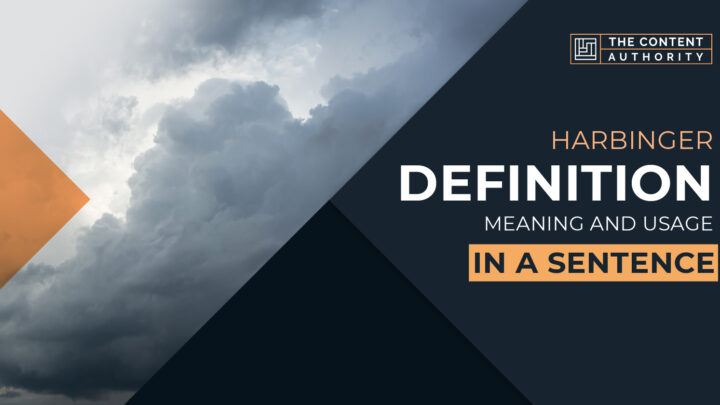English is quite a vast language with thousands of words, and it is normal to come across a new word every day. For instance, the word harbinger is foreign to many people, despite being a popular word in the English language. You may be wondering; what is the right harbinger definition, meaning, and how do you use this word in sentences?
Harbinger is a noun for something that foreshadows a future event. It describes something that is a sign of what is to come. It is also a noun for someone that initiates a significant change, like a pioneer. The word can also be used as a verb meaning to give a prediction.
If you are interested in learning more about this word, continue reading this post. We will detail what you need to know about the definition, meaning, and usage in sentences. More so, we will touch on the spelling, pronunciation, syllables, and history. Let’s get straight into it.
 What is the Definition of Harbinger?
What is the Definition of Harbinger?
Harbinger is defined as “predicting a future event or warning about something to come.” The definition applies in daily life. Science and religion also embrace this word to predict what will happen after some time.
Before you give a warning, there must be some credible data that increases the chances of something happening. That’s why most warnings come from people who know what they mean. For instance, a parent can warn a child about their behavior. Scientists and historians can also warn about some occurrences based on the trends or research findings.
Below are some examples in a sentence:
- Scientists are now giving harbingers on the effects of global warming.
- We all know that historians were the first to reveal harbingers of the fall of Rome.
- War often harbingers the downfall of a country’s economy
There are many instances where “harbinger” describes a sign for a future event. For instance, heavy clouds are a sign of upcoming rain. A thunderstorm is a harbinger of a rainstorm. In a sentence, you can say, “Today’s clouds are a harbinger of a big rain we should start experiencing in less than two hours.”
Here are more example sentences to help you learn:
- We just witnessed three harbingers of a rainstorm
- Everyone knows that the groundhog is a harbinger of seasonal changes.
- The truce between the two countries was a harbinger of their collaboration.
Does Harbinger Mean Prediction?
The two words have a close meaning. Harbinger means a sign or indication of something yet to happen. Simply put, “a sign that predicts.” Prediction is all about forecasting or a prophecy about a future occurrence. Both words indicate what will happen.
You can also use harbinger to refer to something that usually comes before announcing or indicating what is to follow. That means the word describes an anticipatory sign of an upcoming event.
Here are examples to help you compare these two words:
- Robins and crocuses are harbingers of the spring season.
- Bitcoin was the harbinger for cryptocurrencies.
- Sneezing makes it easy to predict the fast spread of this contagious flu.
What is the Meaning of Harbinger?
Harbinger also means a person who pioneers a trend or a significant change. Use the word to describe something or someone that initiates a big change. It also refers to someone or something that helps open people up to a new activity, technology, or modification.
Here are example sentences:
- Many people will agree that the European Union flag is the harbinger of unity in diversity.
- The famous Kardashian clan is considered a harbinger of social media influence.
- Bitcoin was the harbinger of the crypto-verse and cryptocurrency.
Additionally, the word describes a person sent ahead to prepare for another team to arrive. This is one of the oldest meanings of this word. Below are examples of this:
- The royal team sent a harbinger to prepare their accommodation before arrival.
- The military harbinger has arrived to prepare lodgings and logistics for the rest of the team.
Meanings of Harbinger in Different Subjects
Harbinger is not a word you will find everywhere in most contexts, but history and science subjects have a soft spot for the word. In fact, these two subjects utilize the word in a broad spectrum while retaining the original meanings.
- In History: The word refers to an advanced representative of an army or a royal party that arranged for lodging and entertainment. A harbinger would arrive at a destination to organize for the arrival of a royal party or an army.
- In Science: The word refers to a reaction that precedes another. It can be a chemical or biological reaction. Use this word to explain biochemical reactions that signal the commencement of a new reaction.
How to Use Harbinger in a Sentence
You should use the word harbinger in a sentence as a noun or a verb. Before you attempt using the word in a sentence, you should ensure you have grasped all its meaning. That way, you will not confuse the contexts.
Harbinger As a Noun and Verb
As a noun, use the word to describe a forerunner of an occurrence, someone who foretells a future event. The word is also a noun for someone at the forefront of a change or a trend. Still, in the noun form, use harbinger in your sentences to describe a predictor of an event or someone sent to a place to prepare for someone else’s arrival. As a verb, the word describes a warning of an upcoming event.
Here are some examples of the word as a noun and a verb:
- You can tell who wins a competition if you’re keen on the harbingers of players’ commitment.
- Martin’s prowess on weather made people confuse him for a harbinger.
- The farmers have been advised to be careful with harbingers of rainfall before planting.
10 Examples of Harbinger in a Sentence
Now that you have all the information you need to understand the meaning of the word harbinger, you can start using it in sentences. Below are ten examples of the word harbinger in different forms.
- Groundhogs are the primary harbingers of changes in most seasons.
- Whenever I see clouds, I know they are harbingers of an approaching storm.
- It took a short message from Tom to harbinger the end of his relationship with Amber.
- The presence of war is a harbinger of hard economic times.
- A persistent headache is a harbinger of a flu virus.
- The birth of their first child is a harbinger of a long-term relationship.
- Some people view bats and black cats as harbingers of bad luck.
- The royal team sent a harbinger to prepare their accommodation before their big day.
- The takeover from the young manager is a harbinger of organizational changes.
- Many movies portray the grim reaper as the harbinger of death.
How Do You Spell Harbinger?
The correct spelling for the word is “H.A.R.B.I.N.G.E.R.”
When writing the word, most people forget the “r” before the “b.” Leaving out any letter or adding one can entirely change the word’s meaning. You must be keen on how you spell this word.
How Do You Pronounce Harbinger?
In American English, the word is pronounced as /haar.buhn.jr/. However, in British English, it is pronounced as /haa.buhn.juh/.
According to the International Phonetic Alphabet, the word harbinger is pronounced as hɑːbɪnʤə. Learning how to pronounce the word correctly in different English accents will come in handy when you want to address various people.
How Many Syllables Are In Harbinger?
The word has three syllables, “har – bin – ger.”
The stressed syllable in harbinger is “har.” Understanding the syllables and how they appear in a word comes in handy when practicing how to pronounce a word appropriately.
History & Etymology of Harbinger
The word dates back to the early 1100s. It stems from the word herbergere, or herbeger.
Harbinger comes from the Middle English words, Herberger or Herberger, which describes a member of a royal retinue that assigns lodging to guests or rides ahead to prepare a lodging for the team. It was also used in France to refer to a forerunner.
Its meaning has changed significantly throughout the years. For instance, in the 1100s, the word referred to a forerunner of something else. Or a sign that something was approaching, a warning, or a herald. At some point, the word referred to a signal that something unpleasant was approaching.
With time, more was added to its meaning. The meanings kept changing, and by the 1700s, the term meant any sign acting as a herald of things to come. The meaning has not changed much since then.
Synonyms Of The Word “Harbinger”
- Herald
- Indication
- Indicant
- Forerunner
- Precursor
Antonyms Of The Word “Harbinger”
- Conceal
- Deny
- Refrain
- Withhold
- Repress
 When Was Harbinger First Used?
When Was Harbinger First Used?
The word harbinger’s first use dates back to the 1100s.
Conclusion
“Harbinger” sounds complex, but its meaning is quite simple. It is a noun for something that precedes an event or someone, as a sign of something approaching, or someone who rides ahead to prepare a lodging for a larger group. You can now practice using the word in various contexts by constructing creative sentences.
Shawn Manaher is the founder and CEO of The Content Authority. He’s one part content manager, one part writing ninja organizer, and two parts leader of top content creators. You don’t even want to know what he calls pancakes.

